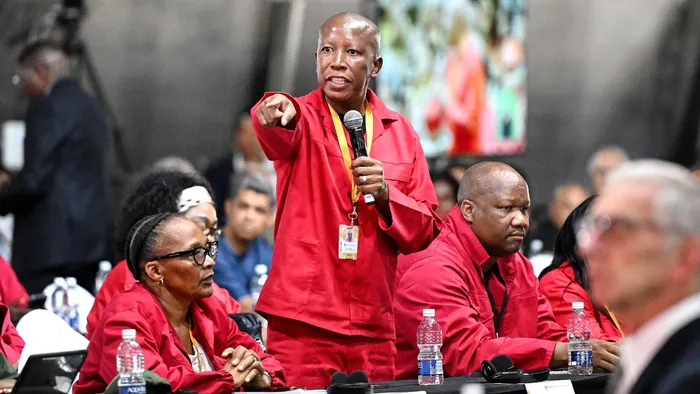
EFF leader Julius Malema has addressed supporters in Kwakwatsi, Free State, defiantly singing the controversial chant despite global backlash.
Image: Phando Jikelo/Parliament of SA
In a fiery address to supporters in Koppies, Free State, on the eve of a crucial by-election, Economic Freedom Fighters (EFF) leader Julius Malema vehemently opposed the government’s proposal to relax Broad-Based Black Economic Empowerment (B-BBEE) requirements to facilitate Elon Musk's Starlink's entry into the South African market.
Malema’s comments came in the wake of a high-profile meeting between President Cyril Ramaphosa and former US President Donald Trump, another signal of shifting dynamics in the nation's policy-making.
Malema directly accused the government of catering to foreign interests at the expense of local economic transformation, stating, “Today, a tender is given in the White House without advertisement, where (Johann) Rupert stands up and says, why is Elon Musk's Starlink not given an opportunity in South Africa?”
This assertion highlights the potential undercurrents of international influence that may be affecting local policy decisions.
The proposed changes, which Malema labelled an affront to South Africa’s transformation efforts, were launched by Minister of Communications and Digital Technologies, Solly Malatsi, who is a member of the Democratic Alliance (DA).
In an official gazette, Malatsi argued that relaxing B-BBEE rules for multinational organisations like SpaceX—Starlink's parent company—was essential for accelerating broadband access towards economic growth. Malema, however, refuted this rationale, contending that such a move would undermine the principles of B-BBEE by undermining local empowerment.
“There is no such law in South Africa. That Starlink will not come into South Africa if it is not complied with the BEE,” he affirmed, underscoring that at least 30% of ownership must be distributed among Black South Africans, which he believes is paramount for inclusive economic benefits.
He articulated a vision of broad-based empowerment, asserting, “That 30% must go to black people, as many as possible, because we want to benefit from our own economy.”
Malema’s criticisms were echoed across various political circles, particularly when it became clear that regulatory easings were tabled less than 48 hours following the high-level meeting where Rupert urged the fast-tracking of Starlink's market entry citing pressing issues of crime, economic stagnation, and the imperative for technological advancement.
The Portfolio Committee on Communications and Digital Technologies has since summoned Minister Malatsi to provide clarity on the policy directives intended to ease B-BBEE requirements specific to satellite services, amid claims of contravening the Electronic Communications Act in favour of the low earth orbit satellite provider.
Committee Chairperson Khusela Diko highlighted the growing concerns regarding this shift in policy, indicating it warrants immediate investigation, as its repercussions could resonate throughout South Africa's ICT landscape.
The pressure on the South African government is mounting as economic stakeholders and political parties alike scrutinise policies that may cater to international business over local empowerment. With tensions rising, the future of broadband access and transformation in South Africa hangs in the balance, underscored by the nation’s ongoing struggle for economic equity.
DAILY NEWS